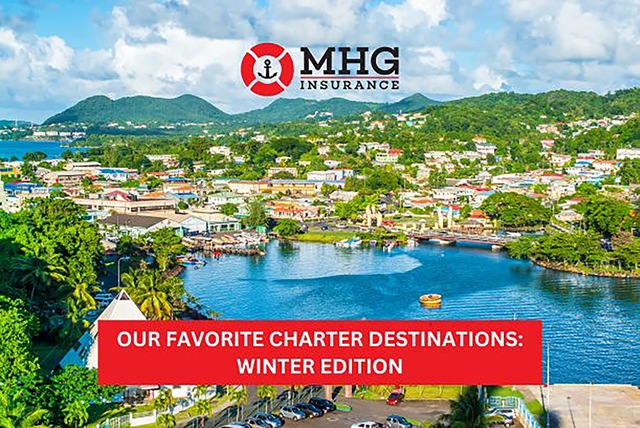 As the winter chill takes hold, the allure of warm, tropical destinations becomes stronger than ever. For those seeking a luxurious escape to sun-drenched beaches, crystal-clear waters, and stunning coastlines, a winter yacht charter promises the perfect getaway. Whether your goal is relaxation, adventure, or cultural exploration, the right destination can make all the difference.
As the winter chill takes hold, the allure of warm, tropical destinations becomes stronger than ever. For those seeking a luxurious escape to sun-drenched beaches, crystal-clear waters, and stunning coastlines, a winter yacht charter promises the perfect getaway. Whether your goal is relaxation, adventure, or cultural exploration, the right destination can make all the difference.
However, with all the excitement of planning such a trip comes the risk of unexpected disruptions. That's why protecting your investment with trip cancellation insurance is essential, and MHG Insurance is here to provide the peace of mind you need. After all, the last thing you want is to lose out on your dream charter because of unforeseen circumstances.
This Winter edition highlights a few of our favorite charter destinations that shine during the colder months. We'll also emphasize how trip cancellation insurance can safeguard your trip of a lifetime, ensuring that if plans change, you're covered.
The Caribbean: A Timeless Winter Getaway
The Caribbean understandably remains one of the top winter yacht charter destinations, offering a perfect escape from the cold. With its inviting beaches, warm climate
, and countless islands to explore, the region promises a blend of luxury and adventure. Popular destinations such as Antigua, the British Virgin Islands, and St. Lucia provide a mix of vibrant culture and serene natural beauty.
The British Virgin Islands (BVI) boast calm waters and protected anchorages that make it easy to hop between islands. From the nightlife of Tortola to the untouched beaches of Anegada, the BVIs are an ideal location for both relaxation and exploration. Antigua, meanwhile, is famous for its rich history. Whether you're diving into the turquoise waters or exploring ancient sugar plantations, there's always something to discover in this Caribbean paradise.
The Bahamas: A Short Hop to Paradise
The Bahamas is an excellent winter charter destination for those in America seeking a tropical escape not too far from home. With its proximity to the United States, the Bahamas offers the perfect mix of convenience and beauty. The Exumas
, mainly, are a favorite among charter guests, with their crystal-clear waters, vibrant marine life, and stunning sandbars stretching endlessly into the sea.
Chartering a yacht in the Exumas gives you access to some of the most breathtaking natural sites in the region. Visit Pig Beach
, where you can swim with friendly wild pigs or dive into Thunderball Grotto, made famous by the James Bond film. The Bahamas offers diverse experiences and untouched islands where the only company you'll find is the occasional sea turtle.
The Maldives: Private Luxury in the Indian Ocean
For those looking to combine exclusivity with stunning natural beauty, the Maldives
is a top winter destination. Famous for its overwater villas, crystal-clear lagoons, and incredible marine life, the Maldives offers unparalleled privacy and luxury. This collection of atolls in the Indian Ocean is perfect for those seeking a serene and upscale winter retreat.
Winter charters in the Maldives offer an ideal opportunity to experience its tropical beauty at its finest. The atolls are scattered across the ocean, giving you the freedom to explore tranquil, secluded beaches while enjoying the luxurious amenities of your yacht. Whether diving in the coral-rich waters, relaxing under the palm trees, or watching the sun dip below the horizon, the Maldives provides a dreamy winter escape.
Thailand: A Blend of Culture and Natural Beauty
Thailand's unique blend of natural landscapes and rich cultural experiences makes it a top winter charter destination. The Andaman Sea, dotted with limestone cliffs, emerald waters, and hidden beaches, is particularly captivating during the winter months. Phuket
, along with surrounding islands such as Koh Phi Phi and the Similan Islands, is a favorite among charter guests for its natural beauty and vibrant local culture.
While exploring Thailand, you can indulge in world-class cuisine, discover ancient temples, and immerse yourself in the rich traditions of this Southeast Asian gem. For a more remote experience, the Similan Islands offer unparalleled diving opportunities and secluded beaches, making it easy to escape the hustle and bustle of mainland Thailand.
Protecting Your Winter Escape
As you dream of these winter charter destinations, it's essential to remember that the perfect trip can sometimes be interrupted by the unpredictable. From last-minute health concerns, business obligations, and weather, among many other reasons, the best way to safeguard your experience is through trip cancellation insurance. By partnering with MHG Insurance, you can ensure that your yacht charter investment is protected, giving you peace of mind as you embark on your dream winter getaway.
No matter which destination calls to you this winter—whether it's the sun-soaked beaches of the Caribbean, the serene waters of the Maldives, or the vibrant culture of Thailand—MHG Insurance can help ensure that if life throws a curveball, your trip of a lifetime won't become a financial burden. With the right coverage in place, you can focus on the joy of exploring these incredible destinations, knowing that your investment is secure.
Click here to learn more about our trip cancellation policy, or contact us for a quote today!
Escape winter with a yacht charter in the Caribbean, Maldives, and beyond. Discover our top destinations and learn how we can protect your dream getaway!